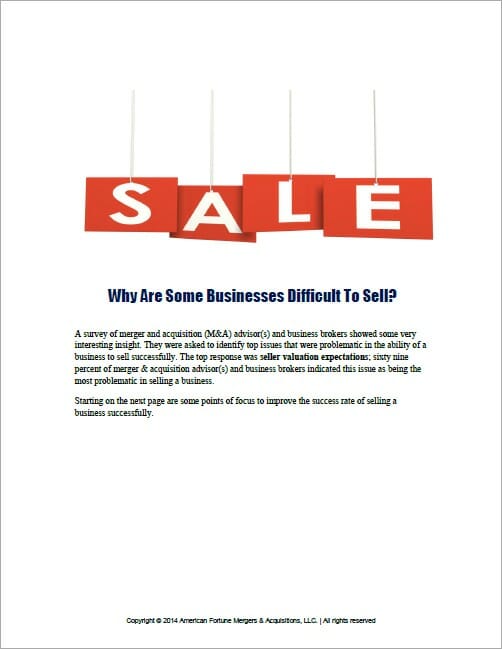Best Time to Sell a Business
When managing day-to-day operations and striving to reach new goals, few business owners have the opportunity to consider when is the best time to sell a business. Unfortunately, this means that many people experience avoidable challenges or miss out on potentially better offers because of poor timing and planning. To successfully sell a business, owners must address many key factors and properly prepare.
Ideally, the best time to sell a business is when the company is performing well, the projections show an even better future, the national economy is iron strong, and the industry has a lot of positive attention on Wall Street.
Regardless of the state of the economy, or the industry, there are some things that any business owner can do to sell a business at the best time for them. The majority of what makes the “ideal time” to sell relies on internal operations and management. There is a lot that business owners can do to create an ideal time to sell.
How Can Owners Prepare to Sell Their Business?
Owners might consider selling their company for different reasons. It doesn’t matter if the owner is looking to sell immediately, or years down the road when they retire, the owner should start preparing now.
Building market value will result in selling the business with the greatest success. Business owners can focus on these elements to build market value:
- Standardize and document all company procedures
- Eliminate liabilities, liens, and resolve outstanding litigation
- Investigate the transferability of leases and contracts
- Maintain company equipment to keep it in safe operating condition
- Secure key employees with employment contracts
- Eliminate under-performing or non-contributing staff
- Establish a management team that can operate without the current owner
- Reduce reliance on the largest customers (diversity customer concentration)
- Improve the facilities
- Ensure the business has clean, reliable, and verifiable financial statements for the past three years
By taking these steps, the company’s market value should increase and make it more desirable to buyers. Some of these steps, such as creating an autonomous management team and eliminating non-performing employees, could improve overall operations for an extended period. Other aspects, such as maintaining equipment and improving the facilities, may become regularly scheduled events. A regular maintenance calendar is a way to keep up the value of equipment and the building.
Market value is often what drives negotiations, and owners should strive to sell their business when the company value is high, and the future looks profitable.
Creating a Successful Sale with a Successful Business
Successful businesses often have successful sales, and it links directly to cash flow. Reducing any unnecessary inventory and collecting outstanding receivables showcases a lean company on paper. The business is holding enough to fulfill orders but not consuming unnecessary costs in storage or inventory holding. Additionally, the company is effectively collecting receivables.
In addition to managing inventory and receivables, owners should consider the following:
- Re-negotiating key supply contracts for more favorable terms
- Reducing personal adjustments on Income Statements
- Establish clear financial controls
Establishing financial controls can help owners even if planning to sell the business seems years away. Good financial controls will enable the company to better allocate resources, assess goals, establish long-term financial stability, and gain a competitive advantage in the market.
Potential buyers aren’t usually looking for fixer-uppers. They want a successful business that has a lot of promise. Some buyers will take more significant risks, but having favorable contracts and well-established financial controls can mitigate some risk for buyers making the business more desirable.
When to Start a Business Sale
The primary issue that owners face is the conflict between running a business and selling a business. Most companies run with a focus on minimizing tax liabilities. The same techniques and accounting practices that reduce tax liabilities also reduces the value of the business. The techniques mentioned above to make a company desirable, and create that ideal time to sell, do the opposite.
Owners should make plans to sell a business three to five years in advance of the anticipated sale time. This time frame allows for enough time to make changes and showcase a track record of maximum profits.
When owners set a future target date, they should also begin questioning what they want out of the sale. It’s possible that they want to finance their retirement, or that key employees or family members stay with the company. Will the owner want to obtain tax benefits through financing part of the sales price? Does the owner want to ensure that the new owner will deliver the same customer service or honor staff contracts? When an owner sets a target sale date and begins making internal changes to build the market value, they should also create a list of priorities.
Owners should consult with an M&A professional to ensure there aren’t any surprises during the business sale process.
Considerations in Timing a Business Sale
When bringing together preparations to sell a business, those in charge of coordinating the sale should consider both overarching elements and opportunity-related factors. Overarching elements can include the state of the economy and the market. These factors can help an M&A professional or business owner to decide if it’s the right time to sell, considering external elements. Then, the opportunity-related factors should start discussions with the business owner concerning specific offers.
Overarching elements can include:
- Seller’s Market – A “seller’s market” happens when there are many interested buyers and a low volume of available businesses to purchase. Fewer firms on the market put the sellers at an advantage. Typically, a company will sell faster and experience competitive offers from multiple potential buyers in a seller’s market.
- Great economy – Essentially, the economy is good when on a wide-spread scale, people have money to spend, unemployment rates are low, businesses are succeeding, and there’s growth in multiple markets. A good economy can set the stage for the best time to sell a business. It can result in more consumer spending, more investors looking to buy businesses, and better approval odds for financing.
- Low-Interest Rates – One of the elements in correctly timing the sale of a business rotates around a buyer’s potential to acquire financing. Financing becomes more accessible and favorable for buyers when interest rates are low. Low rates could mean that someone who has the skills and passion necessary to run the company could also access the financing necessary to competitively bid against other offers.
Elements that are specific to an opportunity can include:
- Availability of Funding – If a buyer can’t secure funding, it’s not the right time to sell. Much of finding the best time to sell a business depends on the potential buyers involved. If a business owner can’t find a buyer that is qualified and able to run the business and has funding, then it’s better to wait for a better time than to compromise. Within this element, it’s clear how external factors such as the state of the economy can impact individual deals.
- Business is Booming – Ironically, a company experiencing substantial growth is in its prime time for getting on the market. This is usually when business owners are at their busiest and aren’t thinking about the best time to sell a business. But, when a company is quickly growing, buyers want to get in on the upswing, rather than buying the business when the business hits a plateau.
Other factors, externally and internally, can change when it’s a good time to sell for the business. Ideally, the company should see continued success, if not growth, after transitioning to a new owner. For that to happen, the business needs conditions that will enable it, and the new owner, to thrive. But, the seller should also obtain the benefits they’re looking for from the sale of the business. All of it comes down to proper preparation and timing.
Why it’s Vital to Find the Best Time to Sell a Business
Earning planning can help any business owner decide when it’s the best time to sell a business. It can help the company be flexible for changes in the economy and make the business as desirable to investors as possible. Through proper planning, a business can build its market value, improve cash flow, and establish the priorities of the sale.
When a business owner first realizes that they might sell their company, they should get help from professionals that manage mergers and acquisitions. With the help of the right professionals, an owner can establish timing that maximizes value, ensures the sale’s confidentiality, and protects the company’s success.
To accomplish this, work closely with professionals who can prepare the business for sale and prepare a business valuation report value and successfully sell the business. At American Fortune, business owners can work with experienced professionals that know how to prepare a company and usher it through a successful sale.
To learn more about the M&A profession go the following site: Alliance of Merger & Acquisition Advisors







